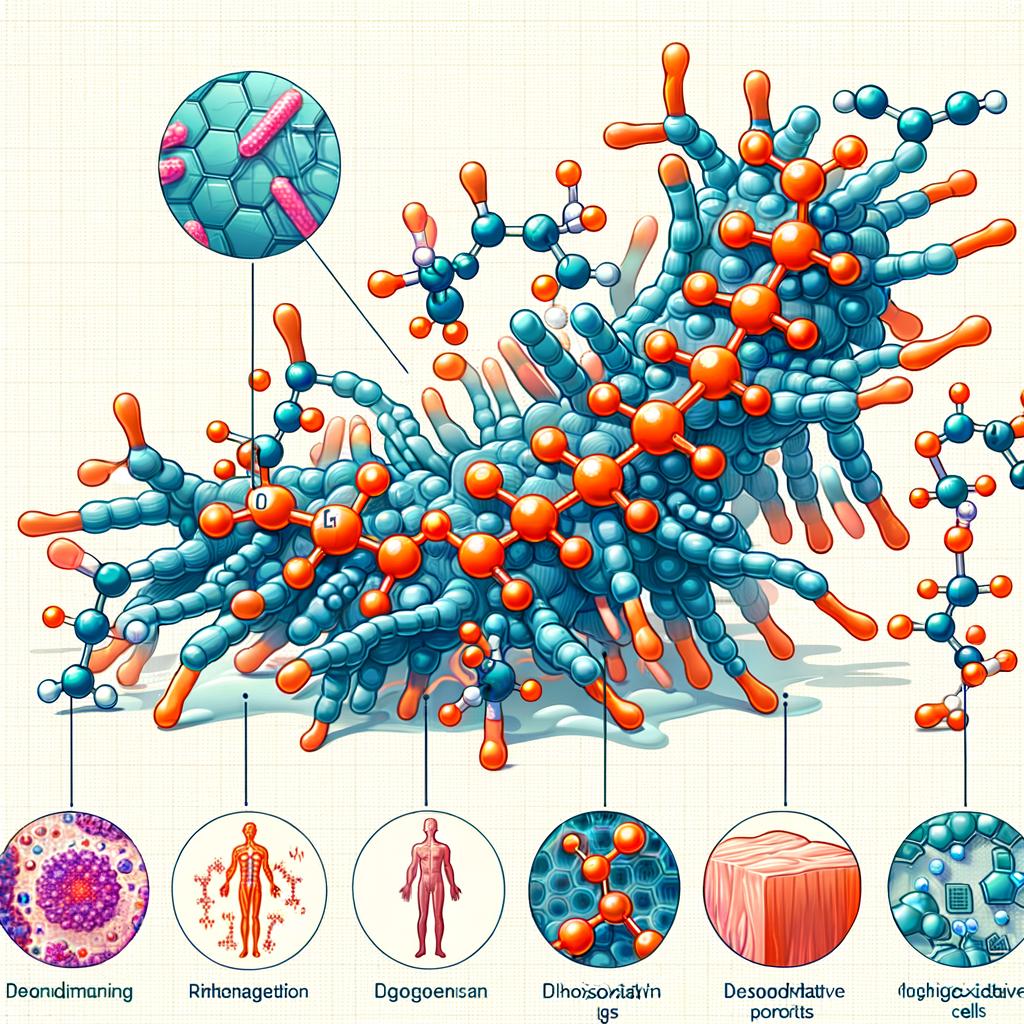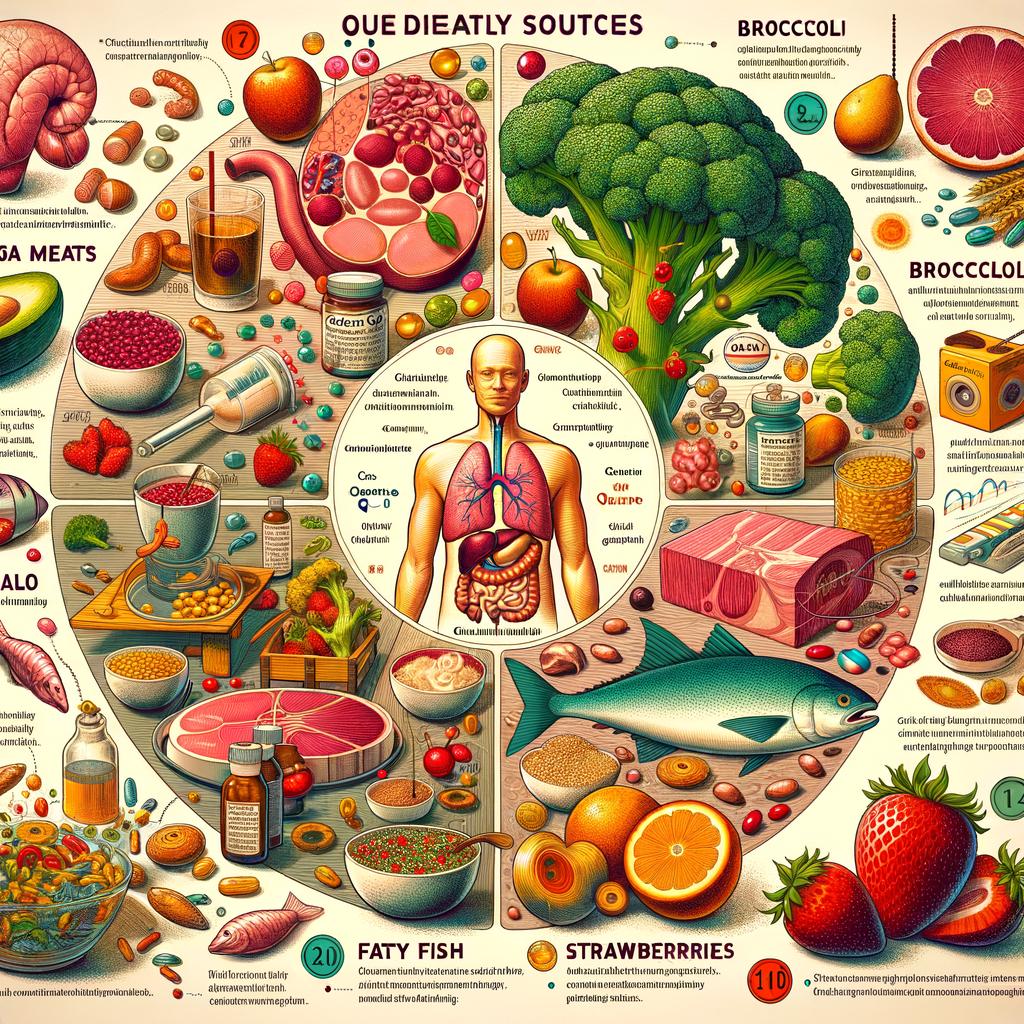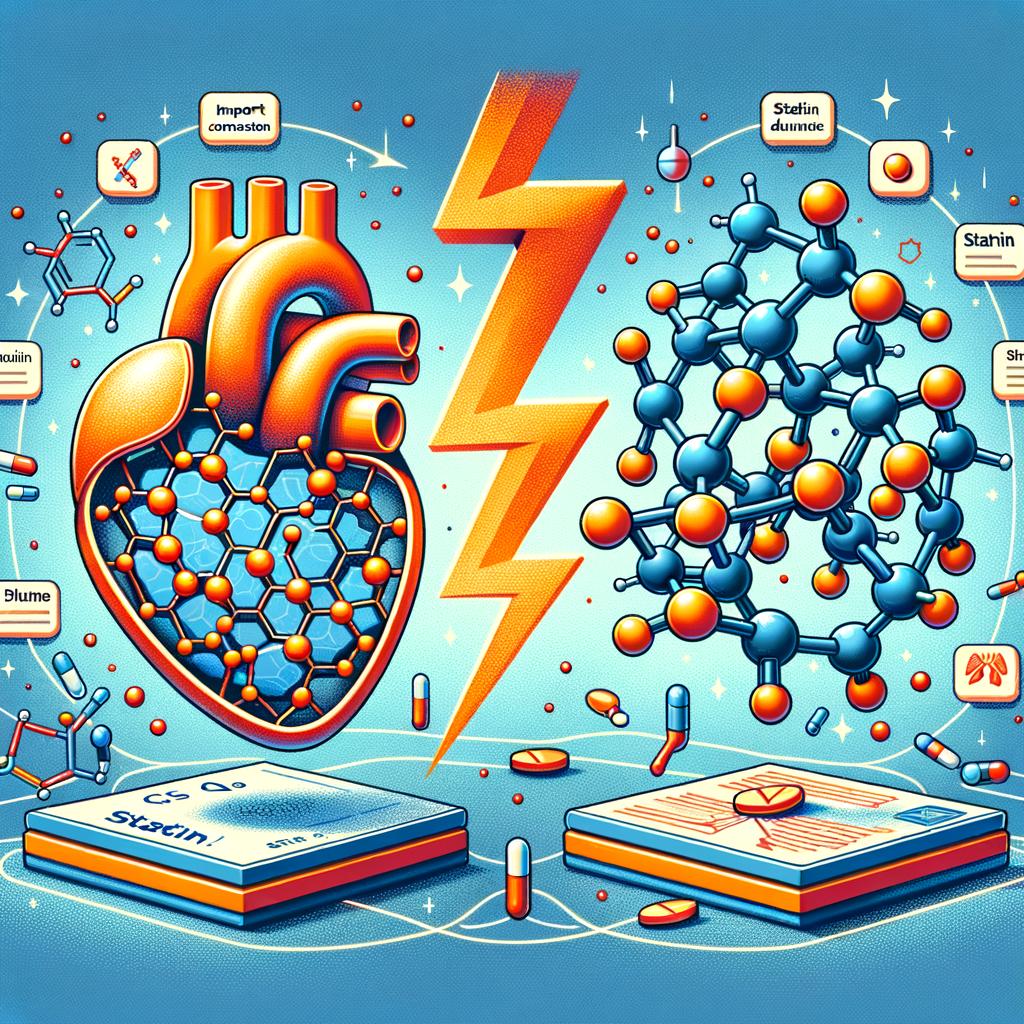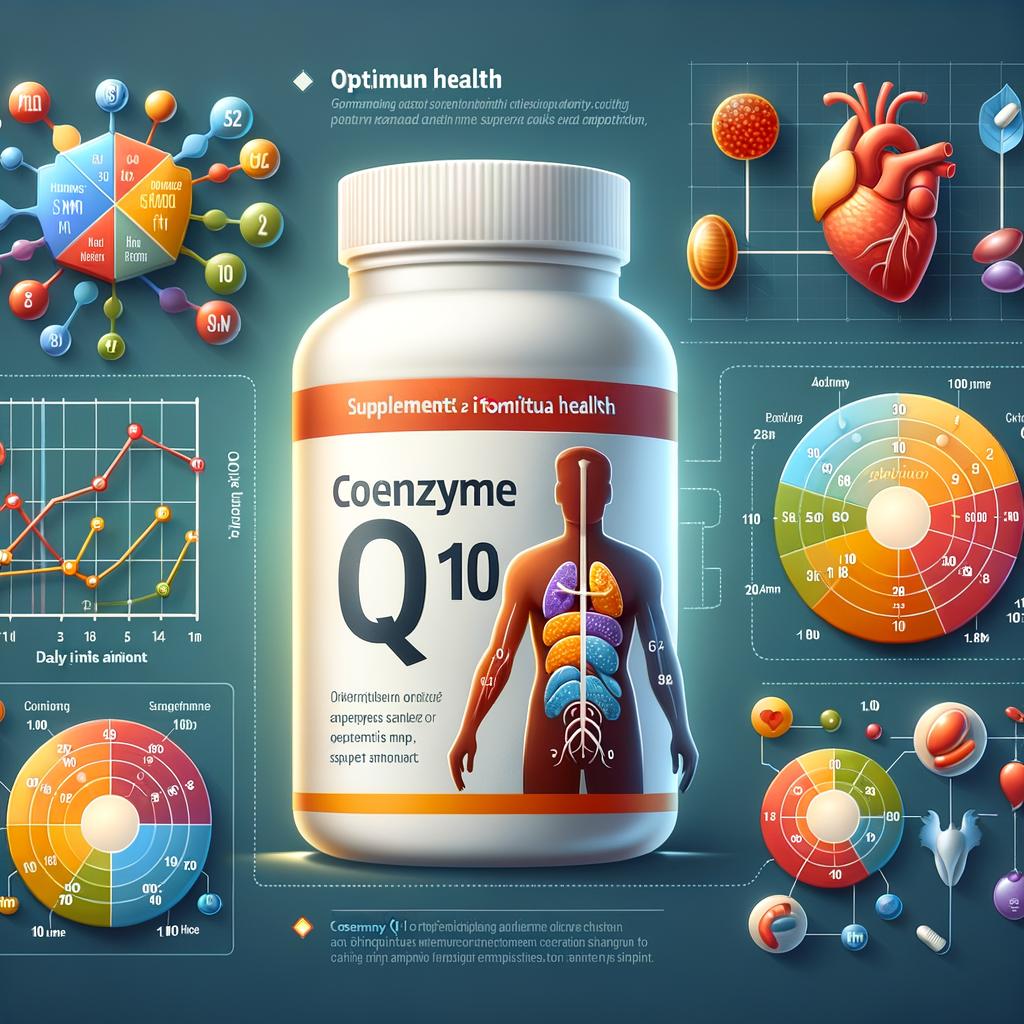Unlock the enigma of coenzyme Q10 with us as we dive into a fascinating discussion with the skilled naturopathic doctor, Dr. Janine Bowring, popularly known as Dr. J9. This blog aims to dissect and understand the comprehensive world of coenzyme Q10 – the quintessential energy generator for our bodies. With its realms spanning across our heart, liver and much more, coenzyme Q10 forms the basis of our cellular health. Not just that, Dr. J9 takes us into the intricate details of how the body’s production levels sways with age and gender, and brings forth an interesting correlation with cardiovascular diseases. Also, if you are on certain medications such as statins, you may want to pay close attention to your coenzyme Q10 levels. So come, join us, unravel the secrets of this all-important compound and learn how to optimize your body’s performance!
Table of Contents
- Understanding the Marvel of Coenzyme Q10 and How it Works
- Delving Into the Dietary Sources of Coenzyme Q10 and Why it is Essential
- The Age-dependent Drop-off in Coenzyme Q10: Implications for Health
- Coenzyme Q10 and Statin Drugs: An Important Connection You Need to Know About
- Coenzyme Q10: Daily Intake Recommendations for Optimum Health
- Q&A
- The Conclusion
Understanding the Marvel of Coenzyme Q10 and How it Works

The marvel of coenzyme Q10, commonly known as CoQ10, is its ability to drive energy production within our bodies. CoQ10 gets its name from ‘coenzyme quinone’ and has 10 units in its sub tail, a unique structure that aids energy utilization in our bodily tissues. It’s intriguing to learn that CoQ10 is produced by our liver and plays a key role in transferring electrons to our mitochondria cells — all to manufacture energy, or more precisely, adenosine triphosphate (ATP).
Food sources such as oily fish and organ meat, especially liver, do contain some CoQ10 — albeit in smaller amounts than our bodies require for optimal function. Tissues that need and utilize CoQ10 the most include the heart muscle, liver, kidneys, and skeletal muscles. For this reason, people who engage in weight training often find taking CoQ10 as a supplement useful in enhancing workout routines and muscle mass development. Uniquely, CoQ10 aids the ‘tightening’ of cell basement membranes, vital for overall cellular health.
Besides energy production, CoQ10 also helps in metabolizing carbohydrates, fats, and proteins — our crucial macronutrients. Importantly, it shuttles glucose and fats into mitochondria, transforming them into energy. Despite its immense benefits, the production of CoQ10 decreases significantly as we age. Take a look at the table below:
| Age Group | CoQ10 Production |
|---|---|
| 20s | High |
| 30s | Medium |
| 40s and above | Low |
Intriguingly, men’s livers are more proficient at producing CoQ10 with age compared to women’s. Consequently, women, particularly those post-menopause, are more susceptible to cardiovascular diseases due to lower CoQ10 production. Interestingly, if you’re taking statin drugs (typically to lower cholesterol levels), your CoQ10 levels may decrease rapidly. As such, it’s essential to follow a conducive supplementation regime to ensure optimal CoQ10 levels, regardless of age or gender.
Delving Into the Dietary Sources of Coenzyme Q10 and Why it is Essential

Describing the role of Coenzyme Q10, or CoQ10 as it’s often called, Dr. J9 explains that this coenzyme, also known as quinone, is crucial for several functions in our body. Predominantly produced by the liver, CoQ10 plays a central role in the transfer of electrons into our mitochondrial cells, a process vital for the production of energy, or ATP. The coenzyme is particularly important for the tissues in the body that require a lot of energy. These include the heart muscle, liver, kidneys, and skeletal muscles.
With respect to dietary sources of CoQ10, the liver stands out as a rich source, besides oily fish. However, the concentrations obtained through food are minuscule compared to what our cells need for ATP production. The unfortunate reality is that the body’s production of CoQ10 declines sharply with age. This dip is especially pronounced in women, presenting a potential cardiovascular risk given the liver’s diminished ability to produce sufficient CoQ10. In addition, certain medications, such as statins used for regulating cholesterol levels, can significantly deplete the body’s CoQ10 levels.
| Tissue | CoQ10 Requirement |
|---|---|
| Heart Muscle | High |
| Liver | High |
| Kidneys | High |
| Skeletal muscles | High |
The Age-dependent Drop-off in Coenzyme Q10: Implications for Health
Dr. Janine Bowring explains the role and significance of Coenzyme Q10 (CoQ10) inside our bodies. It’s a substance that naturally produced by the liver and is crucial for our health, especially tissues that use a lot of energy. This includes our heart muscle, liver, kidneys and skeletal muscles. CoQ10 aids in the transfer of electrons within our mitochondrial cells, thereby helping to manufacture energy (ATP). It is also found, albeit in minimal amounts, in certain foods like oily fish and organ meats, including liver. Besides fueling our cells, CoQ10 also plays a pivotal role in managing the metabolism of our carbohydrates, fats, and proteins, and shuttling glucose and fats into the mitochondria to be converted into energy.
However, as explained by Dr. Bowring, there is a noteworthy downfall to this significant substance. The production of Coenzyme Q10 significantly declines with age. This decline can have severe ramifications, particularly on our vital tissues that depend heavily on CoQ10. More importantly, women are at a distinct risk for cardiovascular diseases owing to this decline. Their liver lacks the capability to produce sufficient levels of CoQ10 as they age, unlike men. Furthermore, statin drugs, often used to lower cholesterol levels, can precipitate a rapid decrease in your CoQ10 levels. Hence, it becomes essential to ensure that you are supplementing your body with adequate amounts of CoQ10, particularly if you are concerned about your cardiovascular health or consuming statin drugs.
| Source | CoQ10 Content |
|---|---|
| Oily Fish (per 100 gram serving) | 5 – 25 mg |
| Organ Meats (per 100 gram serving) | 10 – 20 mg |
| Statin Drugs | Can significantly decrease CoQ10 levels |
Coenzyme Q10 and Statin Drugs: An Important Connection You Need to Know About

Coenzyme Q10, also known as CoQ10, plays a critical role in our bodies. This substance aids in the electron transfer in our mitochondrial cells, facilitating the production of energy, or ATP. Its sources, although in limited quantities, include oily fish and organ meats such as liver. However, an interesting fact about CoQ10 is that our body’s ability to produce it declines as we age, leading to a potential inadequacy.
Key users of CoQ10 within our body encompass the heart muscle, liver, kidneys, and skeletal muscles. Particularly, people engaged in intensive workouts or weight training may benefit from CoQ10 supplementation. Moreover, CoQ10 has a critical role to play in fortifying the basement membranes of our cells, hence supporting overall cellular health. It also aids in the metabolism of carbs, fats, and proteins and helps transport glucose and fats into the mitochondria for energy conversion.
A point of concern to note is the significantly falling production of CoQ10 with increasing age. A decline is observed from the vibrant youth years to later ages, as graphically represented by various studies. Distinctively, women’s liver, unlike men’s, doesn’t produce CoQ10 as efficiently with age, putting them at higher risk of cardiovascular diseases.
Another critical aspect to be aware of is the connection between statin drugs and CoQ10. If you are on statin drugs, typically prescribed for lowering cholesterol levels, you might encounter a rapid decrease in your CoQ10 levels. Therefore, ensuring an adequate daily intake of CoQ10 becomes crucially important, especially if you’re taking a cholesterol-lowering statin drug.
Coenzyme Q10: Daily Intake Recommendations for Optimum Health

The energy powerhouse known as Coenzyme Q10, or CoQ10, has a significant role in the functioning of our bodies. Predominantly produced by our liver, CoQ10 is instrumental in the transfer of electrons into our mitochondrial cells which in turn helps to make energy, or ATP. What makes this compound so essential is the broad scope of its impact, influencing everything from our heart and skeletal muscles to our kidneys and liver. It is also found in several foods such as oily fish and liver
- CoQ10 and Exercise: In particular, those who maintain a high-intensity workout routine, especially weightlifters, can greatly benefit from CoQ10. This is due to its ability to support muscle mass and amplify workout results.
- Cellular Health: Another fascinating benefit of CoQ10 is that it aids in tightening the basement membranes of our cells, essential for overall cellular health. It also modulates the metabolism of our carbs, fats, and proteins, the macro-nutrients.
- Production Decline with Age: Unfortunately, as we grow older, our production of CoQ10 decreases. What was once abundant during our vibrant youth, dwindles as time progresses. This can be clearly seen looking at the rapid reduction of CoQ10 with age – a concern especially for women due to their liver’s reduced capacity to generate adequate amounts of CoQ10 with age.
- Effects of Statin Drugs: An important reminder is that if you are taking a statin drug, typically prescribed to lower cholesterol levels, it may impact CoQ10 levels in your body. These medications tend to rapidly decrease CoQ10, increasing the importance of ensuring you’re getting enough of it each day.
| Age | Level of CoQ10 |
|---|---|
| 20 years | High |
| 40+ years | Low |
| On statin drugs | Very Low |
Given the importance of CoQ10 in our bodies, it’s vital to ensure you’re getting enough of it, whether through diet or supplementation. This is especially crucial if you’re aging, active in weightlifting or on statin drugs. Thus, integrating a regular intake of CoQ10 can help unlock the true potential of your health and wellness journey.
Q&A
Q: What is coenzyme Q10 and what does it stand for?
A: Coenzyme Q10, also known as coq10, stands for coenzyme quinone. It is a compound that plays a crucial role in energy production in our body.
Q: How is coenzyme Q10 produced in our body?
A: Coenzyme Q10 is produced by our liver. It is needed for the transfer of electrons into our mitochondrial cells, which helps in the production of energy or ATP.
Q: In which foods can we find coenzyme Q10?
A: Coenzyme Q10 can be found in oily fish, such as salmon, as well as organ meats like liver. However, the amounts of coq10 in these foods are relatively small.
Q: What tissues in our body utilize the most coenzyme Q10?
A: The tissues that utilize the most coenzyme Q10 include the heart muscle, liver, kidneys, and skeletal muscles.
Q: How can coenzyme Q10 benefit people who exercise or train regularly?
A: People who work out frequently or engage in weight training may have an increased need for coenzyme Q10. Taking it as a supplement can help improve workout routines and muscle mass.
Q: Besides energy production, what other functions does coenzyme Q10 serve?
A: Coenzyme Q10 helps tighten the basement membranes of our cells, contributing to overall cellular health. It also aids in the metabolism of carbohydrates, fats, and proteins, as well as shuttles glucose and fats into the mitochondria for energy production.
Q: What happens to our production of coenzyme Q10 as we age?
A: Unfortunately, as we age, our production of coenzyme Q10 drops off dramatically. This reduction is most noticeable in the vital tissues that require coq10 on a daily basis, such as the heart and liver.
Q: Is there a difference in coenzyme Q10 production between men and women?
A: Yes, there is a difference. As men age, their liver’s ability to produce coenzyme Q10 remains better compared to women. This puts women at a higher risk of cardiovascular disease due to the lack of coenzyme Q10 production in their liver.
Q: How does taking statin drugs affect coenzyme Q10 levels?
A: Statin drugs, which are commonly used to lower cholesterol levels, can rapidly decrease coenzyme Q10 levels in the body. It is important for individuals taking statins to supplement their diet with coenzyme Q10 to maintain optimal levels.
Q: Why is it important for women to ensure they are getting enough coenzyme Q10?
A: Women are at a higher risk of cardiovascular disease due to the lower production of coenzyme Q10 in their liver. Therefore, it is crucial for women to ensure they are getting enough coenzyme Q10 through supplements or diet.
Note: The conversation was limited to the available transcript, and thus, the final answer might lack contextual information.
The Conclusion
We’ve journeyed through the phenomenal world of Coenzyme Q10, guided expertly by the insights of Dr. Janine Bowring. From its core structure to its essential role in bodily functions, we explored the fascinating universe of CoQ10. This vital life force is not just a cellular warrior, fighting daily battles in our heart, liver, kidneys, and skeletal muscles, but also a prime carrier of energy, shuttling glucose and fats into the mitochondria to be turned into fuel.
We discussed how what we eat plays a key role in our CoQ10 levels – whether you’re a fan of oily fish, or a connoisseur of organ meats, the choice is yours. Yet, it was intriguing to learn that as we grow older, our natural production of Coenzyme Q10 declines significantly, highlighting the importance of being cautious and proactive in combating this decrease- especially for women who are at a higher risk of cardiovascular disease due to this depletion.
Also, it’s not just the natural process of aging – certain drugs including statins used commonly to control cholesterol levels, can drastically reduce our CoQ10 levels, causing us to run on empty. Dr. Bowring believes in constantly staying informed and ahead, and supplementing our diet with CoQ10 where necessary.
But, as every exit leads to an entrance, the end of our CoQ10 expedition leaves us enriched and empowered, ready to take on life’s challenges, equipped with the knowledge to fuel our bodies more effectively. Until our next scientific adventure, keep learning, keep growing, keep radiating!



